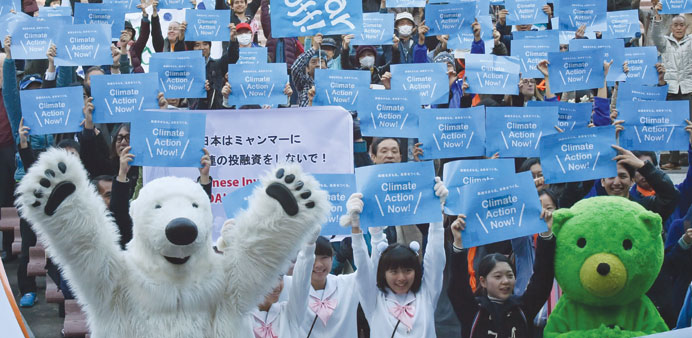AFP/DPA/Sydney/Paris
Protesters joined a worldwide wave of marches yesterday demanding leaders craft a pact to avert a climate catastrophe when they gather in a still-shaken Paris.
From Australia to New Zealand, the Philippines, Bangladesh and Japan, people rallied at the start of a weekend of popular protests pleading for world powers to overcome the logjams when the UN climate summit officially opens in the French capital tomorrow.
“Protect our common home,” declared placards held aloft as thousands gathered in Melbourne.
In the first of three days of People’s Climate Marches in Australia, held in Melbourne on Friday, an estimated 60,000 people marched through the Victorian capital in what organisers claimed was the biggest climate change rally in Australian history.
Yesterday, a climate change rally in Brisbane drew a crowd estimated to be between 5,000 and 10,000 people.
The marchers included a group of Pacific islanders carrying a banner declaring “We are not drowning, we are fighting”, the ABC public broadcaster reported.
Speakers from the Pacific Climate Warriors group told the crowd that many islands faced catastrophic rises in sea levels unless more was done to reduce greenhouse gas emissions.
The demonstrations were organised by the Campaign for Australian Aid.
Campaign spokesman James Norman told DPA that support for the cause had exceeded expectations.
“Months of work went into pulling together over 300 different organisations as supporters, and the timing was significant as well,” he said.
“Given the wider political context in Paris it was a show of solidarity. People can’t protest in Paris because of the security situation,” he said, referring to ban on protests imposed after the November 13 terrorist attacks on the French capital.
More rallies are due to be held today in Sydney, Canberra, Perth, Adelaide and Hobart.
Some 150 leaders, including US President Barack Obama, China’s Xi Jinping, India’s Narendra Modi and Russian President Vladimir Putin, will attend the start of the Paris conference, which is tasked with reaching the first truly universal climate pact.
The goal is to limit average global warming to 2° Celsius (3.6° Fahrenheit), perhaps less, over pre-Industrial Revolution levels by curbing fossil fuel emissions blamed for climate change.
If they fail to do so, scientists warn of a world that will be increasingly inhospitable to human life, with superstorms, drought, and rising sea levels that swamp vast areas of land.
On Friday, French President Francois Hollande, host of the November 30-December 11 talks, warned of the obstacles ahead for the 195 nations seeking new limits on heat-trapping gas emissions from 2020.
“Man is the worst enemy of man. We can see it with terrorism,” said Hollande, who spoke after leading ceremonies in Paris to mourn the victims of the deadly November 13 bombing and shooting attacks that sowed terror in the French capital.
“But we can say the same when it comes to climate. Human beings are destroying nature, damaging the environment. It is therefore for human beings to face up to their responsibilities for the good of future generations.”
Potential stumbling blocks in Paris abound, ranging from financing for climate-vulnerable countries to scrutiny of commitments to curb greenhouse gases and even the legal status of the accord.
The last attempt to forge a global deal – the ill-tempered 2009 Copenhagen summit – foundered upon divisions between rich and poor countries.
French Foreign Minister Laurent Fabius highlighted four key issues still dividing nations, but sounded optimistic that a deal could be reached during the two weeks of talks.
He also said the number of nations that had submitted their plans on how they intended to fight climate change – a key part of the planned Paris agreement – had risen to 183 and now covered 95% of greenhouse gas emissions.
“This is extremely good news,” he told reporters at the summit venue.
Speaking alongside Fabius, United Nations climate chief Christiana Figueres said that the voluntary carbon-curbing pledges would still put Earth on track for warming of between 2.7° Celsius and 3.5° Celsius.
Figueres said that while this was not nearly enough the pledges had moved the world away from a warming of up to 6°C.
“That is fundamental progress,” she said, adding the Paris agreement could “chart the path” for continued improvement in the years ahead to keep warming to between 1.5° and 2°C.
Protest organisers say they expect hundreds of thousands to take to the streets globally this weekend with further rallies planned in Johannesburg and Edinburgh, while similar events were set for today in Seoul, Rio de Janeiro, New York and Mexico City.
In Paris, French authorities cancelled two demonstrations following the onslaught by gunmen and suicide bombers which killed 130 people at restaurant terraces, a concert hall and the national stadium on November 13.
People rallying this weekend have declared their solidarity with activists unable to rally in Paris with a social media campaign tagged #march4me.
However, activists still plan to create a 2km human chain along the original march route today.
They will break the chain as they pass the Bataclan concert hall, where the worst violence claimed 90 lives, as a mark of respect to the victims.
Protesters also plan to leave scores of shoes on Place de la Republique square to symbolise the thousands left frustrated in their plans to march.
One pair of shoes will be placed on behalf of Pope Francis, inscribed with his name and the name of the Papal encyclical he issued on the threat of global warming.

Environmentalists and participants in Tokyo, Japan, Dhaka, Bangladesh, Nantes, France and Geneva, Switzerland take part in rallies as part of the Glob
